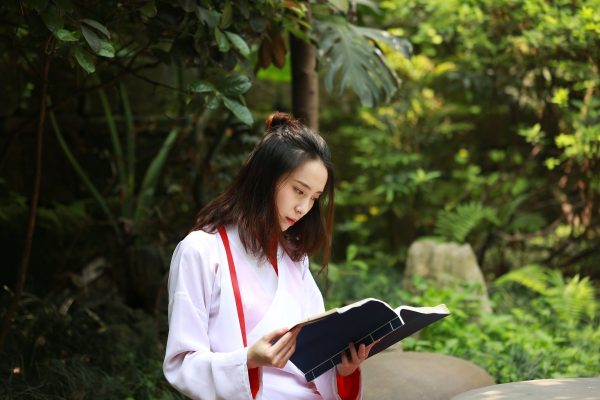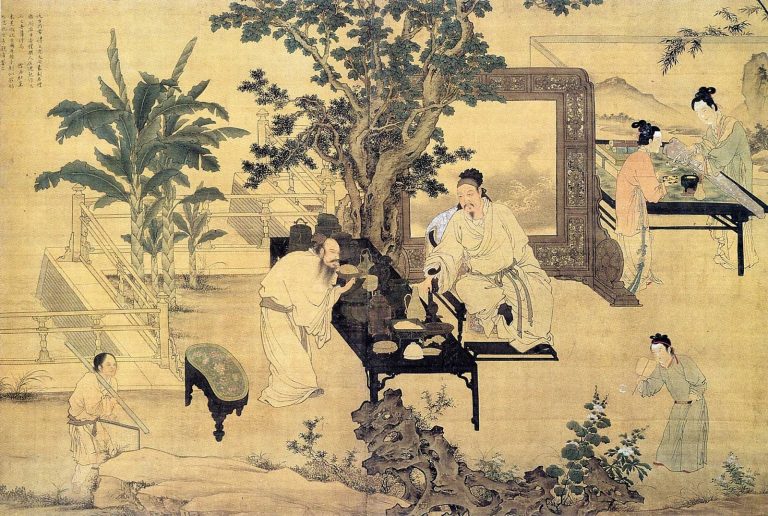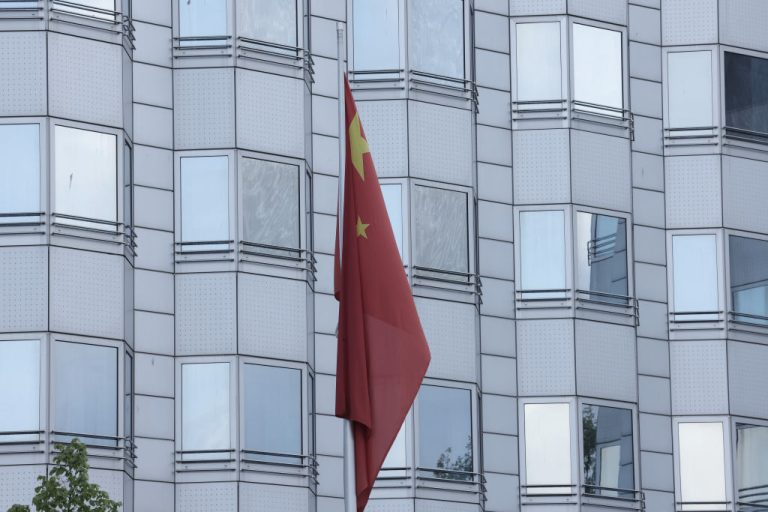One of ancient China’s great medical doctors and herbalists, Sun Simiao (孫思邈), was said to have lived to be 141 years old. He lived through three dynasties, was indifferent to fame and fortune, and held no interest in serving the emperors, preferring instead to make his treatments available to the general public.
Sun was asked to serve as a doctor of state by Emperor Xuan and Emperor Jing of the later Zhou Dynasty, and later by Emperor Wen of the Sui Dynasty, but he declined. He often said to those close to him, “In another fifty years, when a sage appears, then I will be able to help him to relieve the world.”
When Emperor Taizong of the Tang Dynasty came to the throne, he issued an imperial order, inviting Sun to the palace. The emperor was highly impressed with Sun’s spiritual style and divine appearance and exclaimed, “So, Taoists are really esteemed! How can people doubt whether immortals exist in the world?” Taizong was eager to bestow a noble title on the doctor, Sun firmly refused, wishing to cultivate himself and help people.
Sun Simiao spent his life cultivating virtue as the basis for alleviating suffering in the living. He wrote in his book entitled “Thousand Gold Essentials,” “Without virtue, even if one takes precious potions and golden elixir, it fails to prolong one’s life.” In other words, if one’s virtue is poor, one can neither attain longevity nor prolong one’s life, even with the best medicine; if one’s virtue is noble and perfect, one does not need to pray to be blessed and live longer. He saw the cultivation of virtue as the true meaning of life.
Practicing medicine in a time of chaos, exchanging medical care for ginseng
At the end of the Sui Dynasty, the nation was in turmoil, but Sun still practiced medicine throughout China.
At one point, he went to the south, where after an accident, a group of bandits mistook him for a scout. Sun told the lead bandit, “I am not a scout. I am a doctor and I am 70 years old. How could I be a scout?” The men were amazed, as Sun looked to be only 30-40 years old.
“Is he some sort of immortal?” they wondered. The bandit leader decided that if Sun was really a doctor, he wanted him to stay and serve the young and old in their mountain lair. However, he didn’t consider Sun’s services for himself. “I am so strong. What health problems do I have?” he asked.
Sun could see what ailments afflicted the bandit chief. “Do you often have bloating in the chest and abdomen, dry stools, frequent and fine urination, insomnia, bitterness in your mouth upon waking up in the morning, and bleeding gums?” Upon hearing this, the leader was greatly impressed and realized that Sun was not just any doctor.

Success
You are now signed up for our newsletter
Success
Check your email to complete sign up
The chief’s brother was seriously ill and needed ginseng, an essential herb, for treatment. The mountain fortress had no ginseng, so someone would need to obtain it from town. When Sun prescribed the herb, the leader told his fellows, “Brothers, go get it. Just take it from the store.” Sun assured him this was a mistake. “How can you do something bad to save lives?” The bandits did not have enough money to buy the expensive herb, so Sun told them he could work it out if allowed to go down the mountain. Worried that if Sun was allowed to leave, he might not return, the leader had a man follow him and set a six-day deadline.
Sun said his mission was to heal the sick and save the people and promised to return to the mountain. Upon arriving at a pharmacy at the bottom of the mountain, Sun Simiao offered to work for three days in exchange for three taels (about 150 grams) of ginseng, which was just enough to heal the man. The store owner called an acquaintance over to test Sun’s medical skills. Sun diagnosed that the man had been suffering from stomach chill and bloating for three years. The store owner realized Sun was a great doctor and bargained for eight days of work to pay for the ginseng. Sun proposed a six-day term with his deadline in mind but said he would work extra time to make up for the lost days. He also promised to come back in the future.
Once he started seeing patients, more and more people came every day. Three days passed, and the number of patients Sun had received surpassed the total number of people the pharmacy had received since its opening six months before. Patients flocked in, and the store stayed open for longer hours. Sun was exhausted, but he persevered. The owner made sacks full of money.
After six days, Sun finally acquired the three taels of ginseng. Upon Sun’s return to the fortress, the leader, who knew the situation, was very grateful. He offered Sun a reward, while his brother took the medicine and recovered immediately. Sun accepted the leader’s goodwill but declined the reward. He made only one request: to go down to the mountain to visit the former local governor.
Impressed by Sun’s medical virtues, the bandit leader readily agreed. The second an final emperor of the Sui Dynasty, Yang Guang, was a poor ruler, and his subjects were miserable. In such an environment, Sun lived to save the dying and help the wounded, treating both the rich and poor with an equally pure heart under all circumstances. His benevolence moved those who saw him. He embodied the phrase, “a doctor with a benevolent heart because human life is of utmost importance.”In describing what is noble, the ancients used the phrase “strive for the best of all possible worlds.” This means that to make something perfect, one will go to any length, with all their heart, mind, and strength, to the extent of selflessness. It is a virtue that everyone would admire! Nurture one’s mind and body with virtue.
The greatness of Sun Simiao’s noble deeds
Sun Simiao practiced medicine in central China for more than 20 years. He stayed at a house in a small mountain village and placed a small desk at the door. He would sit behind it, facing the patient and attending to him or her as much as possible.
Sun only charged a small fee for medicine, just enough to cover the cost. When he encountered a poor patient, he did not take any money, considering his work charity. Sun not only insisted on charging patients little or nothing, but also was careful to treat his profession with the appropriate solemness. He criticized doctors who chatted and laughed in front of their patients, as it was inconsiderate of their feelings.
Sun wrote: “[The patient] in the corner, sad and alone, not to mention in pain. And the doctor is all happy, thinking only of himself. This is a shame both to the gods and to humans. Average people wouldn’t do it, not to mention a doctor.”
Sun’s reputation throughout the country grew, and more and more people came to him for medical treatment. Concerned about the distance his patients were traveling, he adopted the “touring” method, staying in one place for a while and then moving to another. This way he covered a lot of ground and was able to treat a larger number of patients.

He wrote in his book entitled “Great Physician’s Devotion,” “Whenever a great physician treats a sick person, he must be at peace with his mind, free from personal desires or demands. He will first develop a great compassionate heart, vowing to ease the suffering of all beings. He must not ask whether they are rich or poor, young or old, beautiful or ugly, enemies or friends, or whether they are stupid or wise, but must think of them all as family.”
He also wrote, “Human life is of the utmost importance and is worth a thousand pieces of gold. A prescription to save a life is like a virtue.” Therefore, he put the word “thousand gold” on all his books. He set an example by cultivating his virtue. To enable people to treat themselves for free, he carved the prescriptions for common diseases on stone tablets and placed them at the side of his residence.
Sun Simiao’s virtue-based approach to nurturing the mind and body demonstrates the profound meaning of “reverence for heaven and virtue as the foundation for everything” in 5,000 years of traditional Chinese civilization. This has been a model for future generations to understand the moral traditions of China.







